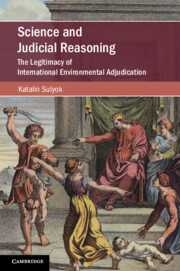Book contents
- Science and Judicial Reasoning
- Cambridge Studies On Environment, Energy And Natural Resources Governance
- Science and Judicial Reasoning
- Copyright page
- Dedication
- Contents
- Tables
- Foreword
- Acknowledgements
- Author Note
- Table of Cases
- Abbreviations
- Part I The Three-Fold Challenge of Engaging with Science in International Environmental Adjudication
- Part II Techniques for Judicial Engagement with Science in the Practice of International Courts and Tribunals
- 3 Judicial Engagement with Science in the Environmental Case Law of the International Court of Justice
- 4 Science in the Practice of Inter-State Arbitral Tribunals
- 5 Science in the Environmental Jurisprudence of Regional Human Rights Courts
- 6 Scientific Claims before the WTO
- 7 Science in the Practice of Investment Arbitral Tribunals
- 8 Science Appears before the International Tribunal for the Law of the Sea
- Part III Engaging with Scientific Knowledge in the Judicial Reasoning
- Bibliography
- Index
7 - Science in the Practice of Investment Arbitral Tribunals
from Part II - Techniques for Judicial Engagement with Science in the Practice of International Courts and Tribunals
Published online by Cambridge University Press: 15 October 2020
- Science and Judicial Reasoning
- Cambridge Studies On Environment, Energy And Natural Resources Governance
- Science and Judicial Reasoning
- Copyright page
- Dedication
- Contents
- Tables
- Foreword
- Acknowledgements
- Author Note
- Table of Cases
- Abbreviations
- Part I The Three-Fold Challenge of Engaging with Science in International Environmental Adjudication
- Part II Techniques for Judicial Engagement with Science in the Practice of International Courts and Tribunals
- 3 Judicial Engagement with Science in the Environmental Case Law of the International Court of Justice
- 4 Science in the Practice of Inter-State Arbitral Tribunals
- 5 Science in the Environmental Jurisprudence of Regional Human Rights Courts
- 6 Scientific Claims before the WTO
- 7 Science in the Practice of Investment Arbitral Tribunals
- 8 Science Appears before the International Tribunal for the Law of the Sea
- Part III Engaging with Scientific Knowledge in the Judicial Reasoning
- Bibliography
- Index
Summary
This chapter first identifies five entry points for science in environmental investment disputes. It continues with analysing framing techniques of both litigants and arbitrators that aim to strategically manage the science-intensity of the legal inquiry. The chapter discusses varied scientific fact-finding methods of investment tribunals. Despite that party-submitted evidence dominates investment arbitration, on rare occasions panels appoint independent experts. As to causal inquiry, the chapter discusses that open causal assessments remain a rarity in arbitral practice, though science-based causal nexus increasingly gains relevance in environmental disputes. As to the standard of review, arbitral tribunals are generally deferential towards the scientific claims of host states. Yet they design different standards to review the scientific basis of host states' risk regulatory measures, for instance, some focus on the transparency of the regulatory process, while others rely on regulatory trends of other states. This chapter concludes with analysing and comparing the various standards of review applied in science-intensive investment arbitral proceedings.
Keywords
- Type
- Chapter
- Information
- Science and Judicial ReasoningThe Legitimacy of International Environmental Adjudication, pp. 212 - 240Publisher: Cambridge University PressPrint publication year: 2020



